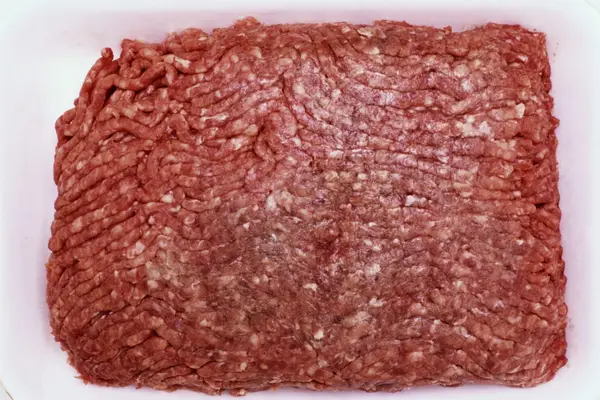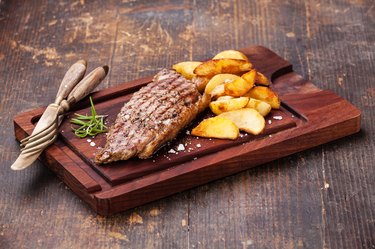Roast beef is a delicious staple that many of us look forward to eating on Sundays or special occasions However, like with any meat, there is always a risk that roast beef can go bad and make you sick if consumed. Eating rotten or spoiled roast beef can have some potentially severe consequences that are important to be aware of. In this article, I’ll walk through what can happen if you eat bad roast beef, how to tell if your roast beef has gone bad, and most importantly – how to prevent getting food poisoning in the first place with proper storage and cooking.
How Can You Tell if Your Roast Beef Has Gone Bad?
It’s critical to know how to identify signs of spoiled roast beef, as eating it can make you very ill. Here are some telltale signs that your roast beef has gone bad and should be thrown out:
-
Bad Smell Fresh roast beef has a mild, beefy smell Rotten roast beef will have an unmistakably sour, ammonia-like or sulfurous odor. Trust your nose – if it smells funky, it’s gone bad.
-
Slimy Texture: Bad roast beef will have a tacky, slimy texture rather than the firm, moist texture of fresh roast beef.
-
Discoloration: Spoiled roast beef may have gray, brownish-green or greenish tinges.
-
Mold Growth: Tiny dots of mold or fuzzy mold growth indicates the roast beef is spoiled.
-
Expired Date: Roast beef should only be refrigerated for 3-5 days. If the sell-by date or use-by date has passed, don’t take risks – when in doubt, throw it out.
-
Just Cooked: Even if you just cooked the roast beef, if it smells bad and looks discolored, do not consume it.
Trust your senses – if the roast beef has an off smell, texture or appearance, that’s your cue to toss it in the trash immediately. Consuming rotten meat is simply not worth the health risks.
Bacteria in Bad Roast Beef That Can Make You Sick
Eating spoiled roast beef puts you at high risk for foodborne illness, as it contains dangerous bacteria that can wreak havoc on your body. Here are some of the most common culprits:
-
Salmonella – Causes salmonellosis, with acute symptoms like diarrhea, vomiting, fever and abdominal cramps.
-
E. Coli – Produces a toxin resulting in severe stomach cramps, bloody diarrhea and vomiting.
-
Listeria – Causes listeriosis which induces fever, muscle aches, nausea and diarrhea. Pregnant women need to be especially cautious.
-
Staphylococcus Aureus – Leads to intensely painful nausea, vomiting and diarrhea.
-
Campylobacter – Results in campylobacteriosis with symptoms like diarrhea, cramping, nausea and fever.
Consuming food contaminated with these nasty bacteria can make you sick for days. While thoroughly cooking roast beef kills bacteria, toxins released by certain bacteria can still lead to illness.
What Happens If You Eat Bad Roast Beef?
Within hours of eating spoiled roast beef, you may start to experience the common and very unpleasant symptoms of foodborne illness:
- Stomach cramps, pain, bloating
- Nausea and vomiting
- Diarrhea – potentially bloody
- Fever and chills
- Fatigue and muscle aches
- Headaches
Symptoms can last anywhere from a few hours up to 10 miserable days, depending on the type of bacteria, your age and health status.
In severe cases, bad roast beef can even send you to the emergency room. Seek medical attention immediately if you experience bloody diarrhea, high fever over 101°F, signs of dehydration or inability to hold down fluids after eating rotten roast beef.
Pay close attention to your symptoms and don’t try to tough it out – food poisoning is no joke and can rapidly lead to dangerous dehydration if severe.
How Long Do Food Poisoning Symptoms Last from Roast Beef?
Most mild cases of food poisoning from roast beef will resolve on their own within 3-5 days with rest and hydration. You can treat symptoms at home with:
- Fluids like water, broths, sports drinks
- Over-the-counter anti-nausea medication
- Probiotics to restore gut health
- Plenty of rest
However, high-risk groups like older adults, young children, pregnant women and those with compromised immune systems may require medical intervention like IV fluids, anti-nausea meds or hospitalization to treat severe symptoms or dehydration.
Don’t hesitate to call your doctor if symptoms last longer than 3 days or worsen even after home treatment. Foodborne illnesses can lead to dangerous dehydration, so it’s essential to get medical care if you cannot keep fluids down.
Can You Die from Eating Bad Roast Beef?
Death from food poisoning is fortunately quite rare, but it does tragically happen in approximately 3,000 cases per year in the U.S. Those at highest risk include:
- Older adults
- Children under 5 years
- Pregnant women
- Individuals with weakened immune systems
While the chances are low, severe dehydration and hospitalization may be required if these high-risk groups experience symptoms after consuming spoiled roast beef. Seek emergency medical care immediately if you see signs of dehydration or are unable to keep fluids down.
How to Prevent Food Poisoning from Roast Beef
Practicing proper food safety principles minimizes your risk of consuming rotten roast beef and contracting foodborne illness. Follow these safe handling tips:
-
Refrigerate promptly – Bacteria multiply rapidly at room temperature, so refrigerate roast beef within 2 hours of cooking.
-
Store at 40°F or below – Keep roast beef chilled at 40°F or lower and use within 3-5 days. Freeze for longer storage.
-
Defrost safely – Thaw frozen roast beef slowly in the refrigerator, never at room temp.
-
Cook thoroughly – Heat roast beef to at least 145°F internal temperature, verified with a food thermometer, to kill any bacteria present.
-
Marinate in the fridge – Don’t leave roast beef marinating at room temperature.
-
Practice immaculate kitchen hygiene – Avoid cross-contamination by washing hands, utensils, and surfaces after handling raw roast beef.
Following food safety basics goes a long way in protecting your health and preventing foodborne illness from roast beef. Make it standard practice when cooking and storing all your meat.
The Takeaway: Don’t Take Chances with Bad Roast Beef
Luckily, you have full control over your risk by properly handling, cooking and storing roast beef. Identify signs of spoilage, don’t eat past expiration dates, cook thoroughly, and refrigerate quickly. With safe food handling habits, we can continue enjoying delicious roast beef without worry.
Stay vigilant, trust your senses, and don’t take chances with bad roast beef. Your health and well-being is too important! Follow proper precautions and your roast beef can stay safe, delicious and nourishing for the whole family.

Identifying Bad or Rancid Meat
Fresh meat usually has a mild smell or no smell at all. In comparison, rancid meat smells strange. Youll know if you have rancid meat in your fridge because it smells sour, sulfuric or like ammonia.
Video of the Day
As meat goes bad, it usually takes on grayish undertones. Bad meat is likely to have notable discolorations. Green and gray-green tints or spots are usually signs of bacterial growth.



The texture of your meat is also indicative of whether or not its gone bad. Fresh meat should be firm and slightly moist. If your meat is slimy or sticky, your meat has likely become contaminated by some sort of microbe.
Not all microbes are dangerous. However, if your meat is contaminated with pathogenic bacteria such as salmonella, staphylococcus, clostridium or E. coli, you can become very sick from food poisoning. The Mayo Clinic says that food poisoning can cause symptoms such as abdominal pain, nausea, vomiting, fever, diarrhea and other gastrointestinal issues.
Cooking and eating spoiled pork, old chicken or any other bad meat isnt guaranteed to make you sick, though. Whether youll get sick will also be determined by whether or not you fully cooked your food.



Many bacteria can be killed during the cooking process. For instance, if youve made a boiled stew or soup and cooked your meat for a while, you may not get sick.
However, heat isnt a guaranteed way to prevent food poisoning. This is because certain bacteria also release toxins, according to the Mayo Clinic. Even when you kill these bacteria by cooking them, their toxins will remain in the food and cause you to become sick.
Preventing Meat From Going Bad
According to the U. S. Food and Drug Administration, you should always keep meat and meat products in your refrigerator at 40 degrees Fahrenheit. This helps prevent spoilage. However, the duration of time meat can be kept at this temperature depends on the product. The FDA states that:
- Poultry can be kept in your refrigerator for two days.
- Ground meat, including sausages, can be kept in your refrigerator for two days.
- Hot dogs can be kept in the fridge for one to two weeks.
- Bacon can be kept in your refrigerator for 7 days.
- Steaks can be kept in your refrigerator for up to 5 days.
- Offal (organ meat) can be kept in your refrigerator for 2 to 5 days.
Meat that is left at 40 degrees F for longer than this amount of time will slowly start decomposing.
Is Hamburger Meat Spoiled When It Turns Grey or Brown Before Cooking? : Meat Preparation Tips
FAQ
What happens if you eat spoiled roast beef?
Risks of eating spoiled meat: – If the spoiled meat is contaminated with pathogenic bacteria like salmonella, staphylococcus, clostridium, or E. coli, it can cause food poisoning (2). – Symptoms of food poisoning can include abdominal pain, nausea, vomiting, fever, diarrhea, and other gastrointestinal issues (2).
What should I do if I ate bad beef?
Staying hydrated is key and drinking lots of water to help dilute and flush your system can help a lot. If what you have eaten causes vomiting or excessive use of the bathroom for longer then 24 hours you should begin to think about seeking medical help as you may have contracted a form of food poisoning.
How to tell if roast beef is bad?
-
Eric Lyonshttps://www.ericlyons.co.ukHow To Tell If Beef Is Bad? Signs You Shouldn’t Ignore | Eric LyonsJan 3, 2025 — Spoiled beef often gives off a sour or rancid odor, which is a clear sign that it has gone bad. … If you press your fingers into the beef and it fe…
-
Food Safety Bloghttps://blog.foodsafety.com.auWhen Raw Meat Changes Colour: How To Check For SafetyOct 27, 2021 — A bad smell, a slimy or sticky texture as well as discolouration are all potential signs of spoilage on meat, seafood or chicken. … It should neve…
Is it okay to eat beef that smells a little?
It’s generally not advisable to eat meat that smells off or has an unusual odor. A slight meaty smell is normal, but any strong or foul odors could indicate spoilage or bacterial growth, which can be harmful if consumed.
